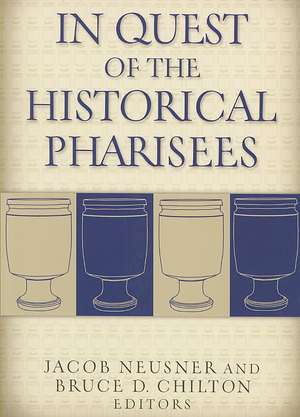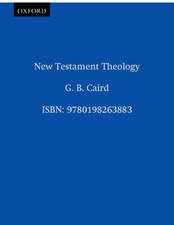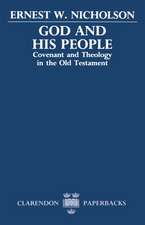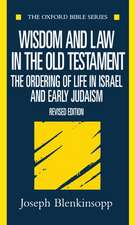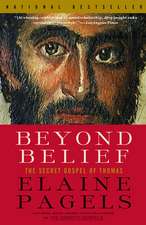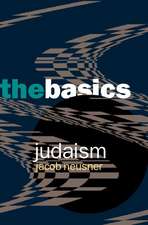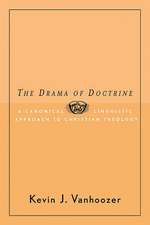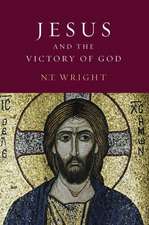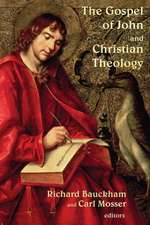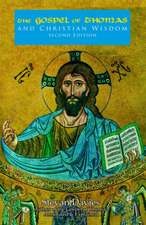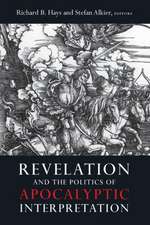In Quest of the Historical Pharisees
Editat de Jacob Neusner, Bruce D. Chiltonen Limba Engleză Paperback – 8 apr 2007
Preț: 369.93 lei
Nou
Puncte Express: 555
Preț estimativ în valută:
70.78€ • 73.91$ • 58.58£
70.78€ • 73.91$ • 58.58£
Carte tipărită la comandă
Livrare economică 04-18 aprilie
Preluare comenzi: 021 569.72.76
Specificații
ISBN-13: 9781932792720
ISBN-10: 1932792724
Pagini: 512
Ilustrații: Illustrations
Dimensiuni: 152 x 229 x 36 mm
Greutate: 0.77 kg
Editura: Baylor University Press
ISBN-10: 1932792724
Pagini: 512
Ilustrații: Illustrations
Dimensiuni: 152 x 229 x 36 mm
Greutate: 0.77 kg
Editura: Baylor University Press
Recenzii
Whether as parents, foils, or both, the Pharisees have always been a focus of interest for anyone interested in the genesis of Christianity or of rabbinic Judaism. This volume allows serious readers an opportunity to learn the sources, to follow the debates, and so to understand and assess a revolution in historical and theological scholarship. Daniel R. Schwartz, Professor of Ancient Jewish History, The Hebrew University of Jerusalem
This is an important book in so many ways. It demonstrates eloquently that "what we can't show, we don't know"-that much of what we assert about Pharisees is simply not supported by the evidence. But it also reminds us that "objective" description is not a matter of either choosing or amalgamating sources, but of realizing that how the Pharisees were perceived and presented is indeed also some part of who they were. We also see how interpretation reveals the interpreter as well as the text: in these assured and well-informed analyses, we also discern the moral and intellectual character of the scholar. Not least, we are confronted with those other Pharisees-of Jewish and Christian mythology and contemporary critical controversy, who long outlived their historical counterparts but who still haunt and fascinate us. Philip Davies, Professor Emeritus, Department of Biblical Studies, University of Sheffield
This is an important book in so many ways. It demonstrates eloquently that "what we can't show, we don't know"-that much of what we assert about Pharisees is simply not supported by the evidence. But it also reminds us that "objective" description is not a matter of either choosing or amalgamating sources, but of realizing that how the Pharisees were perceived and presented is indeed also some part of who they were. We also see how interpretation reveals the interpreter as well as the text: in these assured and well-informed analyses, we also discern the moral and intellectual character of the scholar. Not least, we are confronted with those other Pharisees-of Jewish and Christian mythology and contemporary critical controversy, who long outlived their historical counterparts but who still haunt and fascinate us. Philip Davies, Professor Emeritus, Department of Biblical Studies, University of Sheffield
Cuprins
Preface PART ONE: FIRST-CENTURY ACCOUNTS 1 Josephus's Pharisees: The Narratives, Steve Mason 2 Josephus's Pharisees: The Philosophy, Steve Mason 3 Matthew's and Mark's Pharisees, Martin Pickup 4 Luke's Pharisees, Amy-Jill Levine 5 John's Pharisees, Raimo Hakola and Adele Reinhartz 6 Paul and the Pharisees, Bruce Chilton 7 Paul and Gamaliel, Bruce Chilton and Jacob Neusner 8 The Pharisees and the Dead Sea Scrolls, James C. VanderKam Archaeology and the Pharisees, James F. Strange PART TWO: THE PHARISEES IN RABBINIC JUDAISM 10 The Pharisees and the Sadducees in the Earliest Rabbinic Documents, Jack N. Lightstone 11 The Rabbinic Traditions about the Pharisees before 70 CE: An Overview, Jacob Neusner 12 The Pharisaic Agenda: Laws Attributed in the Mishnah and the Tosefta to Pre-70 Pharisees, Jacob Neusner 13 The Pre-70 Pharisees after 70 and after 140, Jacob Neusner PART THREE: THE PHARISEES IN MODERN THEOLOGY 14 The German Theological Tradition, Susannah Heschel 15 The Anglo-American Theological Tradition to 1970, Jacob Neusner 16 The Debate with E. P. Saunders since 1970, Jacob Neusner PART FOUR: CONCLUSION 17 What Do We Really Know about the Pharisees, and How Do We Know It?, William Scott Green Journal and Series Abbreviations Notes Bibliography About the Contributors
